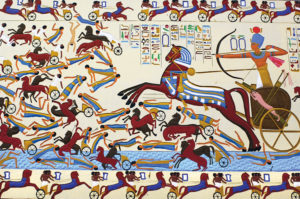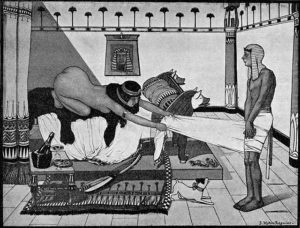
My mind has been a jumble recently of Truth, facts, and fiction. I instantly forget people’s names when I meet them for the first (or fourth) time, but I remember facts about Assyrian hair products from 2018 research. I’ve forgotten what we ate for supper three nights ago, but I know the recipe for ancient Egyptian lipstick.
Is it a gift or a curse? Maybe both. It can be embarrassing during my occasional people interactions, but it’s handy to recall those facts for my day-to-day writing!
A few weeks ago, my newsies—newsletter subscribers—submitted questions as entries to win prizes in our Potiphar’s Wife FB Live Release Party giveaway. WOW, did they offer some incredibly insightful questions! I divided their entries into four categories:
- Research Related
- Truth, Fact, or Fiction
- Writing Related
- Spiritual Themes
I tackled the Research Related questions in last week’s newsletter and will address #3 & #4 in next week’s newsletter. If you’re interested in reading those articles, it’s easy to sign up, and you can unsubscribe any time. (CLICK HERE to subscribe, and you’ll receive a FREE downloadable short story–the prequel to Potiphar’s Wife!)
Truth, Fact, or Fiction
 If you’ve followed my writing for very long, you know I tackle biblical fiction with a 3-layered approach.
If you’ve followed my writing for very long, you know I tackle biblical fiction with a 3-layered approach.
- Biblical Truth – Scripture is the foundation of every story and is never adjusted or compromised.
- Historical Facts – are scholars’ findings, the building blocks resting on God’s Truth.
- Creative Fiction – is the mortar of imagination, holding Truth and fact together in a believable story world.
Nearly half of the questions submitted boiled down to the most common query I get from readers:
How much is from the Bible? And how much is fiction?
In the following sections, I’ve condensed the questions and categorized them under the main characters. If you’d like to know what’s Truth, fact, or fiction about some of my other books, click on the website pages below:
The Reluctant Rival: Leah’s Story
I hope to eventually have Truth, Fact, and Fiction pages for ALL MY BOOKS!
What’s True About Potiphar?
“Potiphar, an Egyptian who was one of Pharaoh’s officials, the captain of the guard, bought him from the Ishmaelites who had taken him there.” Genesis 39:1
Question #1
- How did Potiphar rise in rank to be so close to the Pharaoh?
I found nothing in Scripture or historical data to give any clue about Potiphar’s rise to power. His kinship with Pharaoh Khyan was purely fiction but guided by educated facts. Since Khyan was a Hyksos king, and Potiphar was an Egyptian bodyguard, it made sense to me that the two would have had a close relationship–despite the challenging racial bias of the times. Pushpa was also a fictional character, but I wanted a loving character to lend a softer side to these two hardened soldiers.
Question #2
- From the biblical account, I always saw Potiphar as a kind man. He could have had Joseph killed. What made his wife turn to others? Was he cruel to her?
In my first draft, I portrayed Potiphar as very cruel to Zully; in fact, my editor called him a “toxic male” character. The military culture during that time was brutal, so I believe in “real life” he was likely very cruel. However, for readers in our already challenging world of 2022, I softened Potiphar to make him more amiable and likable. Who wants to spend 400 pages with a jerk? LOL!
Question #3
-

https://commons.wikimedia.org/wiki/File:Modern_loose_interpretation_at_the_The_Pharaonic_Village_in_Cairo_of_a_Battle_scene_from_the_Great_Kadesh_reliefs_of_Ramses_II_on_the_Walls_of_the_Ramesseum.jpg
Do you think Potiphar didn’t really believe his wife but imprisoned Joseph in order to save face?
As mentioned above, the military culture of ancient Egypt was brutal, so for Potiphar to show Joseph that kind of mercy speaks VOLUMES. He may have believed Joseph was innocent. Or he could have feared retribution from Joseph’s God. Whatever Potiphar’s TRUE motive for putting him in prison rather than killing him, we know it was all because of God’s sovereignty over Joseph’s life and future.
Question #4
- What happened to Potiphar when Joseph became 2nd in charge?
Neither Scripture nor history gives any indication of what happened to Potiphar after Joseph was released from prison. You’ll just have to read my May 2023 release, In Feast or Famine! I’ll begin sharing posts about that story and its research in my newsletter soon!
What’s True About Zully?
“After a while his master’s wife took notice of Joseph and said, ‘Come to bed with me!’” Genesis 39:7
Question #1
- Was she married and widowed before Potiphar?
CLICK HERE for a brief summary of historical “facts” about Potiphar’s wife in general. Some scholars believed she was Ethiopian, but I found some great resources that pointed to the possibility of her Minoan heritage. Lots of Minoan artifacts have been found in the Nile Delta region that dated to the Hyksos Dynasty–the period I’ve placed Joseph’s story in Egypt.
The Minoans were sea traders, so the idea of a major natural disaster (the fictional earthquake in chapter one of Potiphar’s Wife) became the inciting incident that forced Zully to leave her homeland as a widow. Forced into a marriage neither she nor Potiphar wanted, the stage was set for LOTS of conflict.
Question #2

Wikimedia Commons contributors, “File:Joseph and Potiphar’s wife – J. Kuhn-Regnier 1910.jpg.”
What caused Potiphar’s Wife to seek the advances of other men?
- Was Zuleika really a bad girl or just a really scarred woman who tried to survive the best she knew how?
- In her position, she could have had any man she wanted. What drew her so relentlessly to Joseph when he kept rejecting her?
- Was Zuleika so desperate for affection that she was willing to throw Joseph under the bus even though he had been kind to her and a trustworthy servant?
- Was Potiphar’s wife interest in Joseph a game or challenge to her?
Such great questions! My answer to them all is:
I have no idea!
Trying to figure out this woman’s emotional motivation was the most difficult part of writing the story. What caused her to act, think, and respond the way she did? At first, I wrote her as mentally ill. I mean, seriously, she’s not acting logically. But, again, my editor encouraged me to think about how weary readers would become with a main character who is constantly battling and has little to respect or admire.
Two suggested changes made ALL the difference:
- As a young widow, Zully had experienced love and tenderness and yearned for those qualities in Joseph.
- Ultimately, she became so single-focused on what she longed for (and I don’t mean Joseph), she was willing to do ANYTHING to get it.
Question #3
- Potiphar’s wife always seemed very entitled, in my opinion. What other character traits did you infuse into her for the book?
(* spoiler alert – fact from first chapter revealed in this answer…) I tried to balance her character traits as she grew through plot struggles. As a crown princess, intended to become queen of two Minoan districts–until her husband was killed by the earthquake–she felt entitled to marry Pharaoh. Potiphar, a soldier, was definitely a step down.
The whole story is a humbling process for her–as is the journey toward redemption for many of us! It’s my hope that the traits she displays, both good ones and bad, help readers relate to her and see a little of themselves in both her mistakes and her forgiveness.
Question #4
- How long did Potiphar’s Wife pursue Joseph before she turned on him?
Scripture (above) only says, “after a while,” so we can’t know for sure. The timeline I proposed in the book is purely fiction.
Question #5
- Are there any sources that give an idea of what happened to Zuleika or Potiphar after Joseph was falsely accused and unjustly imprisoned? Did they have children?
Actually, yes. Ginzberg’s Legends of the Jews has much to say about Joseph’s journey, including what happened to Potiphar and his wife after Joseph was imprisoned. Islamic history presents contradicting details, which is common when searching for such ancient historical data, and it all reads a little like a soap opera.
You’ll find my fictional answer to the question at the end of Potiphar’s Wife. To avoid spoilers, I won’t share here.
What’s True About Joseph?
“With me in charge,” [Joseph] told her, “my master does not concern himself with anything in the house; everything he owns he has entrusted to my care. No one is greater in this house than I am. My master has withheld nothing from me except you, because you are his wife. How then could I do such a wicked thing and sin against God?’” Genesis 39:8-9
Question #1
- Is there anything to indicate if Joseph’s faith ever wavered?
The historical resources (mentioned above) imply that Joseph requested imprisonment to be protected from Zuleika’s advances because he was afraid his faith might fail amid her repeated temptations. I watched a few video teachings from Jewish rabbis who indicated Joseph’s temptation rivaled what Adam and Eve endured from the serpent in the Garden of Eden.
But did Joseph’s faith waver? Who can know the heart except God Himself? However, when we read Scripture carefully, we see a slight difference that could point to a significant struggle.
In Genesis 39:8-9, Joseph takes the time to explain all the reasons he’s refusing Zully’s advances, but the day she grabs his cloak is different.
“He left his cloak in her hand and ran out of the house.” Genesis 39:12
He didn’t grab his cloak away from her. Didn’t discuss anything. He simply RAN! I wonder if on that day he was running from his own temptation as well as Zully’s seduction. BUT…that’s fiction, NOT Truth or fact!
Question #2
- Was Joseph ever allowed to marry the woman of his choosing?
You’ll find the answer to that question and MANY more, in the second book of the Egyptian Chronicles series, In Feast or Famine, schedule to release on May 23, 2023!
Potiphar’s Wife Q&A Part III
Next week, I’ll publish Part III of my newsies’ questions on the topics of writing and spiritual themes in Potiphar’s Wife. I hope you’ll subscribe to my newsletter and take a peek at some of the probing questions and (hopefully) interesting answers!
Today’s Questions:
- What was your favorite question?
- What was your favorite answer?
- Do you have other Truth, Fact, or Fiction questions you’d like to see added to the Potiphar’s Wife website page when I add it to the website?



